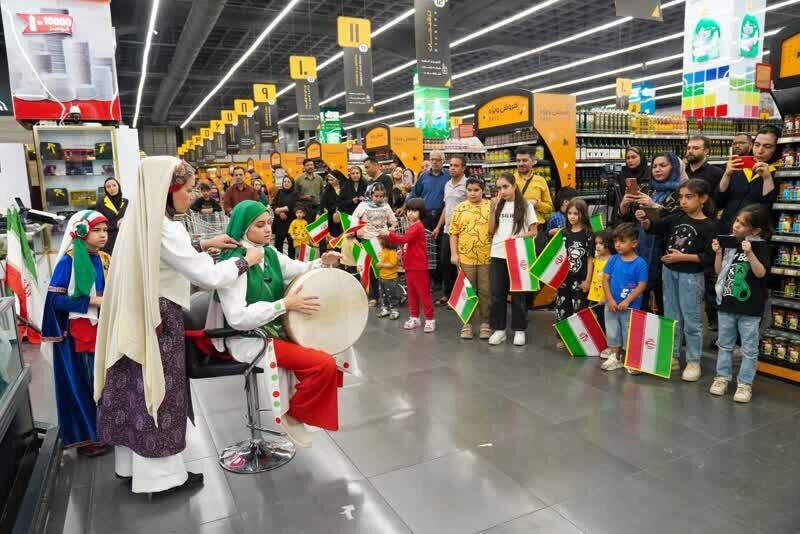Fostering empathy, unity among people through naqqali sessions, street theater

TEHRAN – The regional branch of Art Bureau in Fars Province has organized art programs in public places of Shiraz to boost morale, strengthen social vitality, and foster empathy and unity among the people at a time when the country has been attacked by the aggressive Zionist regime.
Since Saturday, every day from 6 p.m. to 8 p.m., naqqali sessions and street theater have been performed in busy areas of the city like commercial complexes, shopping centers, and historical places in a bid to entertain people in these difficult wartime conditions, IRNA reported.
In the early hours of June 13, Israel launched an unprovoked, large-scale armed attack against Iran. This was an egregious act of aggression by every definition.
Since then, through coordinated air, missile, and drone strikes, it has targeted residential neighborhoods, civilian infrastructure, public authorities, and nuclear facilities subject to International Atomic Energy Agency (IAEA) safeguards, which has resulted in the martyrdom of senior military commanders, prominent scientists, and innocent civilians, including women and children.
In response to the Israeli aggression on Iranian territory, the Islamic Revolution Guard Corps (IRGC) has launched a large-scale retaliatory operation, codenamed “True Promise 3,” targeting multiple Israeli military and air bases through coordinated missile and drone strikes deep inside occupied territories.
According to the deputy head of the Fars Art Bureau, Seyyed Mehdi Movahed, “this event aims to bring people of Shiraz closer together”.
He added that, the artistic programs will continue for ten days and the number of groups is set to increase so that “we can perform in more areas of the city”.
On Sunday evening, the entrance to a shopping mall in Shiraz, turned into a stage for a naqqali (storytelling) session by young girls, with a circle of audience forming around them in less than a minute.
The girls, who were naqqals (storytellers) from Shiraz, narrated verses from Ferdowsi's Shahnameh about the enemy's attack on Iranian soil.
Shahnameh (Book of Kings) is the legendary Persian epic and has always been associated with patriotism and love of the homeland.
What was most noticeable was the people's support and the whispering of verses as they sang with eyes shining with tears: “If there is no Iran, may my body not remain; May no soul live on this land again. Far better if all of us, one by one, were to be killed; than surrendering the country to the enemy in the end”.
Speaking about the performances, Sogand Azadi, one of the naqqals, said: “In the four performances we had over the past two days, people repeatedly asked us to repeat a part of the Shahnameh”.
“In the performances we have had so far, we have seen the friendship of the Iranian people and have repeatedly witnessed the tears of joy of our compatriots,” she added.
Naqqali, or Persian epic storytelling, is the oldest form of narrating tales in Iran and has long played a significant role in society. A naqqal is a storyteller who recites epic tales, primarily revolving around the stories of Iranian mythological kings and heroes.
Ferdowsi's Shahnameh frequently portrays Iran's battles against external enemies, particularly the Turanians, as a central theme. However, the epic also delves into internal conflicts and the consequences of division within Iran. It emphasizes the importance of national unity and the dangers of internal strife, portraying it as a threat to Iran's strength and well-being. While the epic celebrates Iranian heroism and victories, it also highlights the ethical considerations of warfare and the importance of justice and compassion, even towards enemies.
The Shahnameh is a unique literary masterpiece filled with epic, romantic, and mythical stories. Its storytelling style aligns perfectly with narrative traditions worldwide and offers deep insights into Iranian culture, art, and even the governance, and political traditions of ancient Persia. From a linguistic perspective, its rhythmic poetic structure makes it ideal for naqqali and elevates it to a top-tier form of global storytelling.
Hakim Abul-Qasem Ferdows (940-1020) was a Persian poet and the author of Shahnameh, which is one of the world's longest epic poems created by a single poet, and the greatest epic of Persian-speaking countries.
He is celebrated as one of the most influential figures of Persian literature and one of the greatest in the history of literature.
Ferdowsi's patriotism is prominently displayed in his epic poem, the Shahnameh, where he celebrates Iranian history, culture, and language, and champions the values of courage, wisdom, and national pride. His work is seen as a powerful assertion of Iranian identity.
The Art Bureau is a public, semi-governmental organization in Iran. Founded in 1979 in Tehran, it is affiliated with the Islamic Development Organization, which focuses on promoting the foundations, manifestations, and goals of the Islamic Republic through art, both within Iran and internationally.
SS/SAB
Leave a Comment